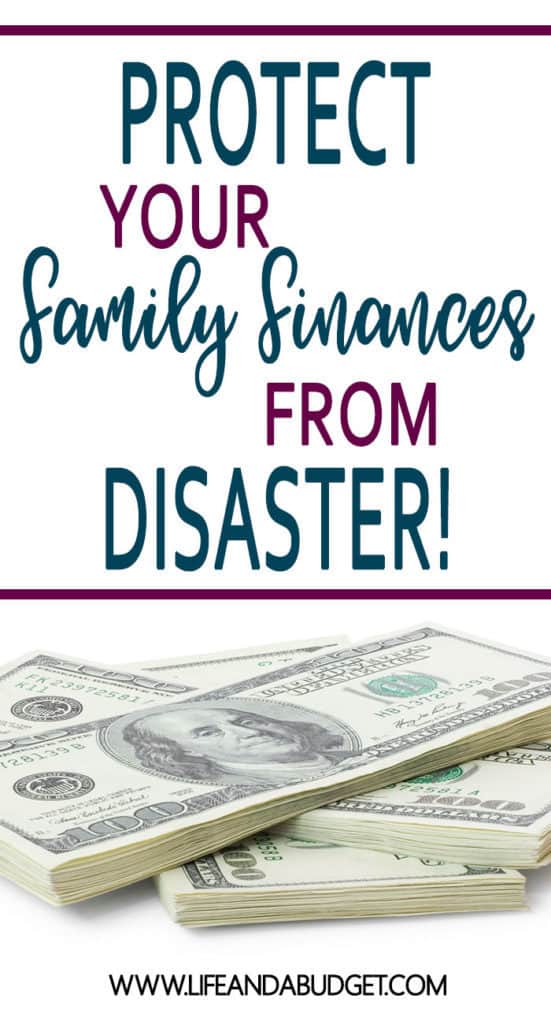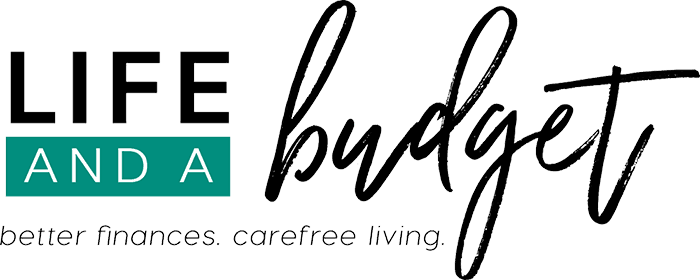Family Finances – This article is going to discuss how to make sure your family’s finances are protected during any potential crisis.
When you think of family finances what’s the first thing that comes to mind? Is it budgeting? 529? A solid emergency fund?
While these are important and a critical component of any financial plan, don’t forget to look at the entire picture.
Like, what would happen if the primary income earner got sick and couldn’t work. Or what would happen to your children if both you and your spouse couldn’t look after them during a medical emergency?
No one wants to think about these things. I sure don’t. But when we are creating a plan for a family finances, we would be doing a disservice to ourselves and our family if we didn’t have a plan for a potential crisis.
So, how do you fully protect your family finances during a crisis?
That’s what we’re going to discuss today. Some of these are obvious, but nonetheless important.
As you read through each of these make sure you ask yourself, “Am I doing everything I could be to protect my family?” If not, don’t be intimidated. Use this as a guide and focus on getting started.

How to Protect Your Family Finances During a Crisis
First things first, you need a family budget.
The first practical step would be to create a budget. None of this other advice would be worth your time if I didn’t advise you to create a plan for your money.
Your budget needs to reflect your current spending habits. You can make adjustments to your spending as you go, but first, you have to write down what you want that plan to look like.
After you’ve done this, you will be able to see where you’re lacking financially and make adjustments. Start by writing down your income and deducting your current expenses. Here’s a free spreadsheet to get you started.
Related Reading – Budgeting for Beginners: The Ultimate Budgeting Series
Create an emergency fund.
After you’ve created a budget, you will know where you can cut back in order to start saving more. This is why creating a budget is so important!
Now you need to create a category in your budget specifically for your emergency fund. Treat this as a bill you would pay yourself. It doesn’t matter if it’s $25, $50, or even $5.
I highly recommend keeping an online bank account for your emergency fund. I’ve used Capital One 360 or years and they will give you $25 if you open up a savings account with a minimum of $250. Sign up using this link to get your $25 bonus.
Create a will.
A will is a legal document that helps you designate who will receive your property and possessions when you pass away. You can also designate a guardian to care for any minor children.
I will admit I put this off for a long time because I thought it would be expensive. We kept a letter in our safe deposit box about our wishes concerning our daughter for the first few years of her life.
What a grave mistake! I’m glad we wised up and learned that our letter wouldn’t hold up in our state and created a will. It was easy and very cheap to do too.
We created a will using Legal Zoom and used their services again to update our will after our son was born. To make sure we had all of our bases covered, we created a will together as a couple and one separately in the event something happened to us on different occasions.
Prices started at $69. That’s a small price to pay for the peace of mind we get knowing our wishes will be carried out as we want. If you don’t have a will, create one today with Legal Zoom.
Create a living trust.
A living trust is a document that states who you want to manage your asset and property if you’re unable to do so. This document will also cover you in the event you pass away. You transfer ownership of your assets and property into the trust and still have control over it. The trust can be managed without going to court and incurring costly legal fees.
A living trust is important to have in the event you become incapacitated and you’re unable to handle your financial affairs. By establishing a trust, you can select someone you trust to handle your affairs according to your instructions.
Legal Zoom also helps you create basic and comprehensive trusts at an affordable cost. If you don’t have a living trust, create one today so you can protect your family finances.
Pay off debt.
Imagine the type of financial freedom you’ll enjoy if your mortgage is paid in full. On the same note, imagine how much less stressful it would be on your spouse if something were to happen to you if you had no debt.
No matter which side of the coin you look at, life without debt looks pretty darn good to me. With every payment you make, regardless if its a credit card or car payment, strive to become debt free.
The fewer people you owe, the better. You will be better prepared to handle whatever life throws at you if you don’t have a bunch of debt. And there will be one less bill to worry about in the event of a job loss, death, or medical emergency.
Purchase life insurance.
Life insurance is very affordable. My husband and I both have term life insurance coverage on the both of us for less than $70 per month. And this is for $550,000 worth of coverage!
When you purchase life insurance, consider burial costs, how much debt you owe and how much money would need to be replaced if something happened to you. Life insurance can be used to pay off your mortgage or student loans.
You also can create a legacy for your children using life insurance. This money can pay for their college education, future weddings, or homes.
If you don’t have life insurance, get a quote from Policy Genius today to protect your family.
Purchase disability insurance.
Sometimes disability insurance is provided through your job, but this isn’t true in all cases. If you are self-employed or work for a company that doesn’t provide this coverage, you need to consider purchasing disability insurance.
If you are injured on or off the job, how would you take care of your family? You might be out of work for sickness or an accident related condition for several weeks. If you don’t work, you don’t get paid.
Of course, if you have a solid emergency fund, this could sustain you during your disability. However, having disability insurance would provide you with even more protection. This way you could use any emergency savings for medical related expenses only.
Live within your means.
Once you create a budget, you’ll quickly learn what your means are. If you only have $3,000 coming in every month, you should strive to live on less than $3,000.
By doing so, you’ll be able to save money and still meet your basic needs. You will also avoid going into debt.
I would rather live within my means now rather than ball out. Eventually, balling out will catch up to you and you’ll be forced to make do with less. Do it voluntary and avoid a headache that comes with living beyond your means.
Related Reading: 70+ Ways to Be More Frugal So You Can Save More Money
Maintain your health.
The last thing anyone wants to worry about during a financial crisis is their failing health. If you lose your job or you’re dealing with any other financial setback, a health scare can only make things worse.
To protect your family finances during a crisis, stay up to date with your regular healthcare maintenance. Take advantage of your yearly check-ups and dental visits.
Also, strive to eat healthily and move as much as possible. Sometimes it’s the simple things we overlook and take for granted. Staying active and watching what we eat are great ways to maintain your health and keep the big doctor bills away.
Diversify your income.
Last, but certainly not least, diversify your income. Oftentimes, relying on one source of income is what can lead to a financial crisis in the first place. Never have all of your eggs in one basket.
There are plenty of ways to diversify your income. You can start a blog, become a freelance writer, or provide virtual assistance services to online business owners.
If you are a heavy social media user, you could sign up for Izea and get paid or social media updates. You don’t even have to have your own website for this. You simply link up your social media profiles and look out for available opportunities.
Wrapping Thangs Up
This wasn’t one of the more pleasant financial topics to talk about, but it is necessary. Don’t sweep this subject under the rug and declare you’ll deal with it later.
The quicker you tackle these issues, the better things will be for you and your family. It’s not easy to go through a financial crisis, but having a plan to handle these setbacks certainly help.
So, do yourself and your family a favor. Select one thing from this list you can do today that will help protect your family finances during a crisis. It’s better to be safe than sorry.
Have you created your plan to protect your family finances yet? If not, what will you start with first?

